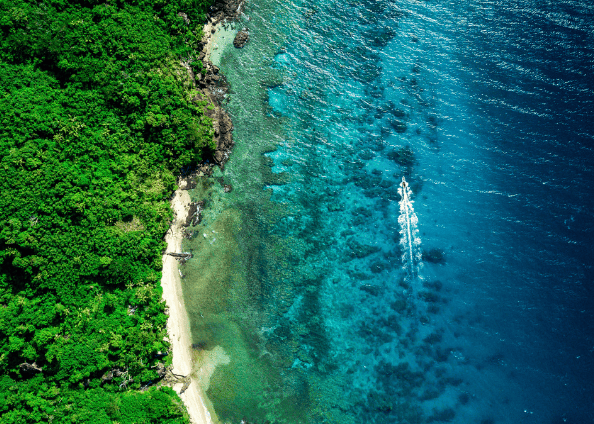

Fiji Travel Guide
Whether it’s for your honeymoon, a family getaway or just to take it slow for a while with some well-deserved downtime, Fiji is the ideal destination with its warm, clear waters, uncrowded coconut palm-lined white sandy beaches, lush tropical scenery and friendly hospitality.
In this guide, we’ll fill you in on everything you need to know to plan your perfect Fiji escape!
Best ways to experience Fiji
A trip to Fiji is usually mostly about rest, relaxation and rejuvenation, with a large portion of your time spent with your feet up either beach-side or pool-side—but when you’re ready to venture away from your hammock or sun lounger, there are plenty of other fun activities and attractions to try while in Fiji.
Here are a few of our favourite ways to experience what Fiji has to offer.
- Explore the underwater world with some snorkelling – It’s almost a rite of passage for every visitor to Fiji to do some snorkelling, taking in the vibrant coral reefs, diverse marine life and crystal-clear waters of this tropical paradise. Spots like the Mamanuca Islands, the Yasawa Islands, Mana Island, Denarau Island or Malolo Lailai Island (Musket Cove) are great for beginners, while more advanced snorkellers may want to try out Rainbow Reef, Beqa Lagoon or Great Astrolabe Reef
- Take a dip beneath the Tavoro Waterfalls – Like the idea of immersing yourself in stunning natural beauty and lush tropical surroundings? Head to Bouma National Heritage Park on Tavenuni, where you can visit three impressive waterfalls, each with their own natural swimming pools where you can enjoy a refreshing dip while reconnecting with nature
- Sample the local produce at Suva Municipal Market – Become acquainted with the local culture by exploring the Suva Municipal Market, with its vibrant and authentic atmosphere and diverse array of fresh produce, spices and handicrafts offered by friendly Fijian vendors
- Witness the fire-walkers of Beqa – In a thrilling and unique cultural experience where locals, often from the Sawau tribe, showcase their bravery and spiritual connection by walking barefoot across scalding-hot stones during the traditional “vilavilairevo” ceremony. Not only will the performance leave you captivated by its spectacular and dramatic display, but also provide a profound insight into the indigenous traditions of Fiji
- Head out on a remote village tour – If you want a more authentic view of what life is really like for Fijian locals, take a village tour, where you’ll be able to do things like watch traditional dance performances, participate in a kava ceremony or even visit a local school. You can even take along donations of things like pencils, rubbers, exercise books, library books or balls and sports equipment to support children in the local community!
Visiting Fiji
Climate
Fiji has a tropical maritime climate with generally warm temperatures throughout the year. During the wet season (from November to April), you can usually expect heavy rainfall and the occasional tropical cyclone, whereas the dry season (from May to October) is marked by cooler temperatures and lower humidity.
Most tourists like to visit during the dry season when the weather is generally sunny and the sea conditions are ideal for activities like snorkelling and diving.
Culture and language
Fiji’s culture is a vibrant mix of indigenous Fijian traditions, with the influence of Indian, European, Chinese and other Pacific Islander communities. English is the official language in Fiji, but Fijian (iTaukei) and Hindi are also widely spoken, reflecting the multicultural makeup of the population.
The traditional Fijian culture places a strong emphasis on communal living, respect for elders and various ceremonial rituals. The friendly and welcoming nature of the Fijian people is a hallmark of the culture, creating an inviting atmosphere for visitors. It’s customary to greet locals with a friendly “Bula!” which means hello or welcome.
When visiting villages or participating in religious ceremonies, it’s important to dress modestly, covering the shoulders and knees as a sign of respect. It’s also important to remove your shoes as a sign of respect before entering someone’s home.
Some places may also have restrictions on photography for cultural or privacy reasons and it’s always good to ask for permission before taking photos of individuals, especially in villages or during ceremonies.
Getting around
When travelling between islands, domestic flights can a quick and convenient option. The main islands are also well connected by boat and ferry services, while smaller, more secluded islands may be easiest to access by smaller boats and water taxis.
To get around on-island, taxis are available in urban areas and can be a convenient option. You may also find ridesharing services in cities like Suva and Nadi.
Many tourists also opt to hire a rental car to explore some of the larger islands like Viti Levu and Vanua Levu at their own pace. Hiring a bicycle or scooter can also be a fun and eco-friendly way to explore your surroundings.
When you choose PassportCard, you’ll also be pleased to know our travel insurance automatically includes rental vehicle excess cover, as well as cover for claims that arise from the use of an electronic scooter provided you wear a helmet and meet the local license requirements for the vehicle you are riding.
Accommodation
The vast majority of visitors to Fiji opt to stay in resort-style hotel accommodation which often includes amenities such as pools, restaurants, spa services and water activities.
If you’d prefer to do something a little different, you can also find boutique resorts (which are often situated in more secluded locations), as well as budget backpacker accommodation, guesthouses and homestays and self-catered holiday rentals. Diving enthusiasts may even opt for liveaboard accommodation which allows them to explore more of Fiji’s impressive underwater reefs and ecosystems.
Entry requirements
Australians travelling to Fiji don’t need to obtain a visa prior to travel. If you’ll be staying for less than four months, authorities will issue you a visa on arrival provided you can provide proof of booked accommodation and a return ticket.
It’s always a good idea to visit the Australian government’s Smartraveller website before your trip for the latest information and updates about travelling to Fiji.
All benefits and covers are subject to the terms, conditions, limitations and exclusions listed in the Combined Financial Services Guide and Product Disclosure Statement (PDS) and on other policy documentation, including the schedule.
Fiji travel insurance FAQs
While travel insurance is not mandatory to travel to Fiji, it is recommended. Travel insurance will ensure you’re prepared if something doesn’t go to plan and can come in handy in a variety of situations, from medical emergencies to lost luggage or stolen cash. Choosing cover that also offers instant claims can also be invaluable while travelling abroad.
The best way to find out how much it will cost to get cover to travel to Fiji is to get an instant quote with PassportCard. It only takes a couple of minutes to get a personalised quote by providing some basic details such as your age, destination/s, travel dates and the level of cover you would like.
Not automatically. If you’re planning on doing any activities like cascading, deep sea fishing, mountain biking, mud buggying, paragliding, quad bike riding, outdoor rock climbing, segway tours or sky diving, you’ll need to add Optional & Adventure cover for these activities when you purchase your travel insurance to make sure you’ll be covered.
Simply call our Global Assistance team on +61 1800 490 478 or contact us on WhatsApp. Our Australian-based Global Assistance team is available 24/7 and can quickly handle most common claims on-the-spot over the phone.
No. Many Australians don’t realise that they won’t be covered by Medicare when overseas. Purchasing travel insurance with cover for medical emergencies and evacuation is essential to ensure you won’t be left to foot the bill if you become seriously sick or injured while travelling.
Preparing for your trip to Fiji
All set for your escape to the South Pacific?
Make sure you’ve ticked these items off your checklist before you head off on your Fijian getaway:
- Check your passport is valid with at least 6 months of validity left from the date you plan to leave the country
- Ensure you meet the visitor entry requirements for Fiji
- Speak to your doctor to see if you’ll need any vaccinations before travelling to Fiji. Some travellers opt to be vaccinated against hepatitis A and B and typhoid in addition to the standard schedule of vaccinations.
- Arrange a travel currency card or another method of payment to cover expenses while you’re away. You may also choose to take some Fijian Dollars (FJD) with you as some places may only accept cash payment.
- Notify your financial institution of your plans to travel
- Contact your phone provider to ensure your phone plan will cover you while you’re away or purchase a pre-paid international sim card
- Arrange accommodation for each location you plan to stay in
- Consider booking any tours or activities you want to do in advance
- Provide details of your travel plans to a family member or close friend not travelling with you so you can be contacted in case of an emergency
- Save the details of how to access emergency consular assistance in case you need it
- Organise your travel insurance with PassportCard.












